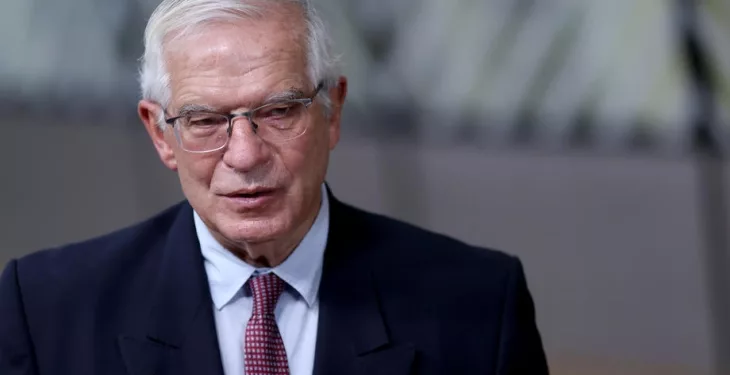EU foreign ministers on Monday (23 October) edged towards endorsing a “humanitarian pause” in the Israel-Hamas war, though some member states have signalled reservations towards the idea. Speaking to reporters after the talks, EU’s chief diplomat Josep Borrell said he backed a call by UN Secretary-General Antonio Guterres for a break in the conflict to allow more humanitarian aid to reach Palestinian civilians in the besieged Gaza Strip, writes Euractiv.
“The Secretary-General of the United Nations spoke of a ceasefire, which is certainly more, much more, than a pause,” Borrell said.
“A pause, as the name suggests, is a pause. That is, an interruption of something that then continues,” he said. “A pause is a less ambitious objective than a ceasefire, (…) which means an agreement between the parties. A break can be agreed more quickly.”
“And I think that the ministers have understood it that way, that this pause is necessary, even for humanitarian aid to enter,” he said.
“I can anticipate – or can, at least, consider – that the idea of a humanitarian pause, as something that would facilitate the entry of humanitarian aid and allow displaced populations to take cover, is something that the member states have supported,” Borrell added.
EU members including France, Spain, the Netherlands, Ireland, Slovenia and Luxembourg have also so far backed the idea.
Separately, an early draft communiqué for an EU summit later this week, seen by Euractiv, suggested support for the idea, though EU diplomats cautioned the language used was still subject to change.
According to the draft text, EU leaders were to state they would “support the call of UNSG Guterres for a humanitarian pause in order to allow for safe humanitarian access and aid to reach those in need”.
Worsening situation in Gaza
The moves reflected increasing alarm about the fate of Palestinian civilians after two weeks of Israel bombarding and blockading Gaza in response to the 7 October Hamas attack.
More than 5,000 Palestinians have been killed in Israeli strikes, according to the enclave’s health ministry. About 1.4 million of Gaza’s 2.3 million population are now internally displaced, according to the United Nations.
Over the weekend, two aid convoys – one of 20 trucks, the other of 14 – entered Gaza from Egypt at the Rafah crossing, according to regional officials.
However, the amount of aid delivered represents only a fraction of the regular amount of aid that was streaming into Gaza before the war started.
“The agreement is on the need to ensure that convoys can continue to pass through Rafah – so there has to be a very substantial increase in humanitarian aid,” an EU diplomat said after the talks.
“After that, on the question of the humanitarian truce, the ceasefire and the corridors, there are nuances of position, there is a whole range, and we can’t say that there has been a clear-cut position,” they said.
But some EU member states earlier on Monday had shown to have reservations about the proposal.
“It’s not correct yet to speak of a consensus, there are discussions and we will see their outcome,” a second EU diplomat said.
Asked why Germany had not backed calls for a humanitarian ceasefire, Foreign Minister Annalena Baerbock said recent days had shown the importance of getting aid into Gaza but had also made clear that Hamas was continuing to attack Israel.
“We’ve all seen that the terrorism continues non-stop, that massive rocket attacks against Israel are taking place,” she said. “We can’t end the humanitarian catastrophe when the terrorism from Gaza continues.”
Czech foreign minister Jan Lipavsky cast doubt on the feasibility of achieving a temporary ceasefire with the Islamist group in charge of Gaza.
“There is a terrorist organisation controlling Gaza, sending rockets every day, that perpetrated a barbarous attack on Israel territory,” he said. “So the question is how such a ceasefire should be established. It needs to be established on both sides.”
Italian Foreign Minister Antonio Tajani echoed that, saying: “We can’t tell Israel to stop defending itself when Hamas is firing missiles at its cities.”
“Of course, everyone would wish that the violence comes to an end. But Israel has the right to self-defence,” Austrian Foreign Minister Alexander Schallenberg told reporters.
Others, speaking to reporters ahead of the talks, took a more cautious approach.
Ireland’s Foreign Minister Micheal Martin said his country understood “Israel’s need to deal with Hamas because this was an appalling attack”.
“But the degree of suffering – innocent civilians in Gaza are suffering – it’s not acceptable at all and in our view that’s why we believe a humanitarian pause is required to at a minimum get aid and supplies in.”
Latvia’s Foreign Minister Krisjanis Karins said there would be “no black-and-white solution”.
The divergence in views broadly reflected longstanding differences within the EU over the Israeli-Palestinian conflict, with those seen as more sympathetic to Palestinians pushing for a pause while staunch allies of Israel were more reluctant.

